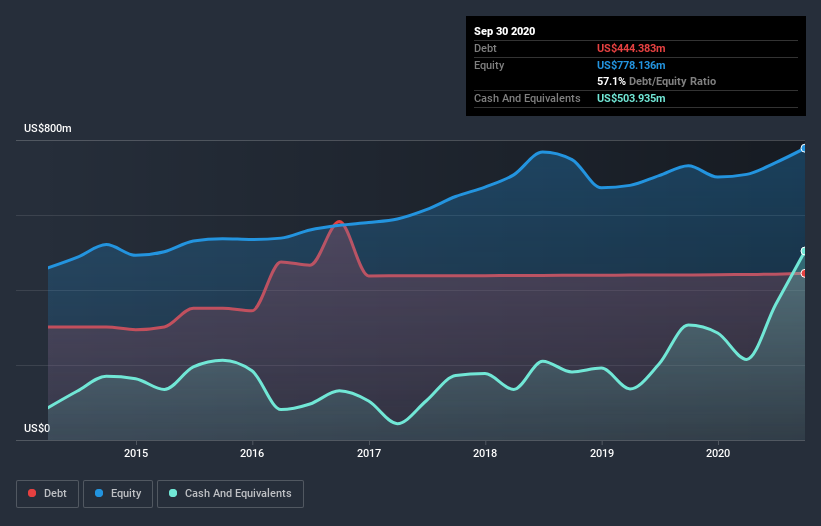Boise Cascade (NYSE:BCC) Could Easily Take On More Debt
Some say volatility, rather than debt, is the best way to think about risk as an investor, but Warren Buffett famously said that 'Volatility is far from synonymous with risk.' When we think about how risky a company is, we always like to look at its use of debt, since debt overload can lead to ruin. As with many other companies Boise Cascade Company (NYSE:BCC) makes use of debt. But is this debt a concern to shareholders?
When Is Debt Dangerous?
Debt assists a business until the business has trouble paying it off, either with new capital or with free cash flow. If things get really bad, the lenders can take control of the business. However, a more frequent (but still costly) occurrence is where a company must issue shares at bargain-basement prices, permanently diluting shareholders, just to shore up its balance sheet. Of course, plenty of companies use debt to fund growth, without any negative consequences. When we examine debt levels, we first consider both cash and debt levels, together.
Check out our latest analysis for Boise Cascade
What Is Boise Cascade's Debt?
The chart below, which you can click on for greater detail, shows that Boise Cascade had US$444.4m in debt in September 2020; about the same as the year before. But it also has US$503.9m in cash to offset that, meaning it has US$59.6m net cash.
How Strong Is Boise Cascade's Balance Sheet?
We can see from the most recent balance sheet that Boise Cascade had liabilities of US$676.4m falling due within a year, and liabilities of US$605.3m due beyond that. Offsetting these obligations, it had cash of US$503.9m as well as receivables valued at US$437.9m due within 12 months. So its liabilities outweigh the sum of its cash and (near-term) receivables by US$339.9m.
Of course, Boise Cascade has a market capitalization of US$1.99b, so these liabilities are probably manageable. However, we do think it is worth keeping an eye on its balance sheet strength, as it may change over time. While it does have liabilities worth noting, Boise Cascade also has more cash than debt, so we're pretty confident it can manage its debt safely.
Even more impressive was the fact that Boise Cascade grew its EBIT by 160% over twelve months. If maintained that growth will make the debt even more manageable in the years ahead. When analysing debt levels, the balance sheet is the obvious place to start. But ultimately the future profitability of the business will decide if Boise Cascade can strengthen its balance sheet over time. So if you're focused on the future you can check out this free report showing analyst profit forecasts.
Finally, a business needs free cash flow to pay off debt; accounting profits just don't cut it. While Boise Cascade has net cash on its balance sheet, it's still worth taking a look at its ability to convert earnings before interest and tax (EBIT) to free cash flow, to help us understand how quickly it is building (or eroding) that cash balance. During the last three years, Boise Cascade generated free cash flow amounting to a very robust 92% of its EBIT, more than we'd expect. That puts it in a very strong position to pay down debt.
Summing up
While Boise Cascade does have more liabilities than liquid assets, it also has net cash of US$59.6m. And it impressed us with free cash flow of US$268m, being 92% of its EBIT. So is Boise Cascade's debt a risk? It doesn't seem so to us. When analysing debt levels, the balance sheet is the obvious place to start. However, not all investment risk resides within the balance sheet - far from it. Take risks, for example - Boise Cascade has 4 warning signs (and 1 which is a bit concerning) we think you should know about.
If, after all that, you're more interested in a fast growing company with a rock-solid balance sheet, then check out our list of net cash growth stocks without delay.
This article by Simply Wall St is general in nature. It does not constitute a recommendation to buy or sell any stock, and does not take account of your objectives, or your financial situation. We aim to bring you long-term focused analysis driven by fundamental data. Note that our analysis may not factor in the latest price-sensitive company announcements or qualitative material. Simply Wall St has no position in any stocks mentioned.
Have feedback on this article? Concerned about the content? Get in touch with us directly. Alternatively, email editorial-team (at) simplywallst.com.

